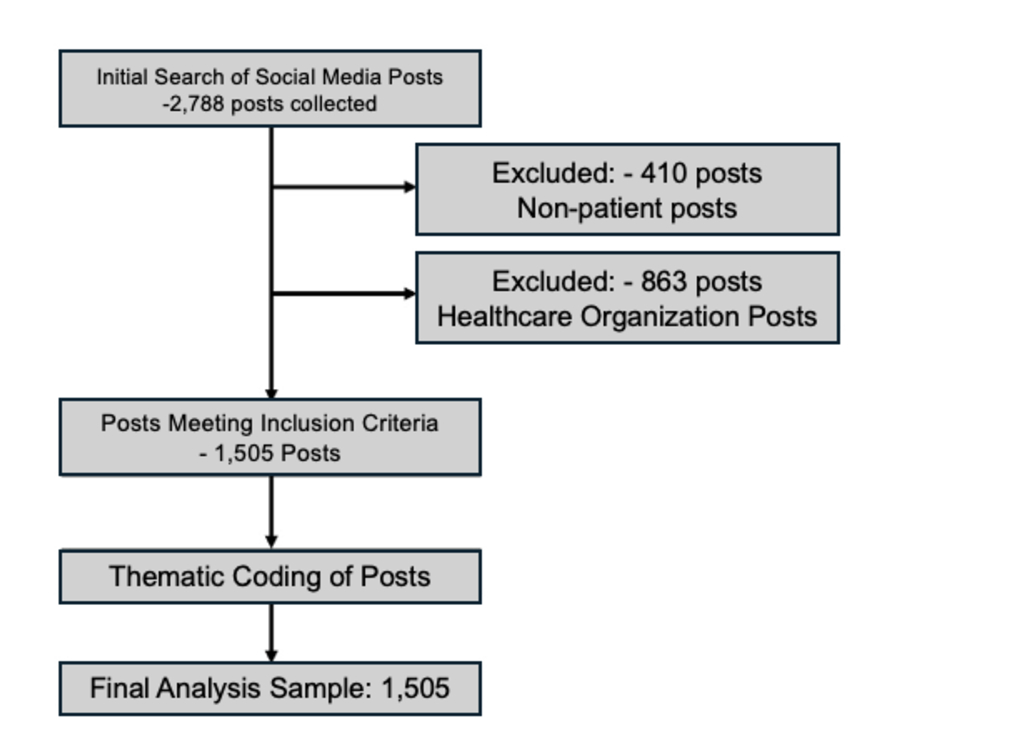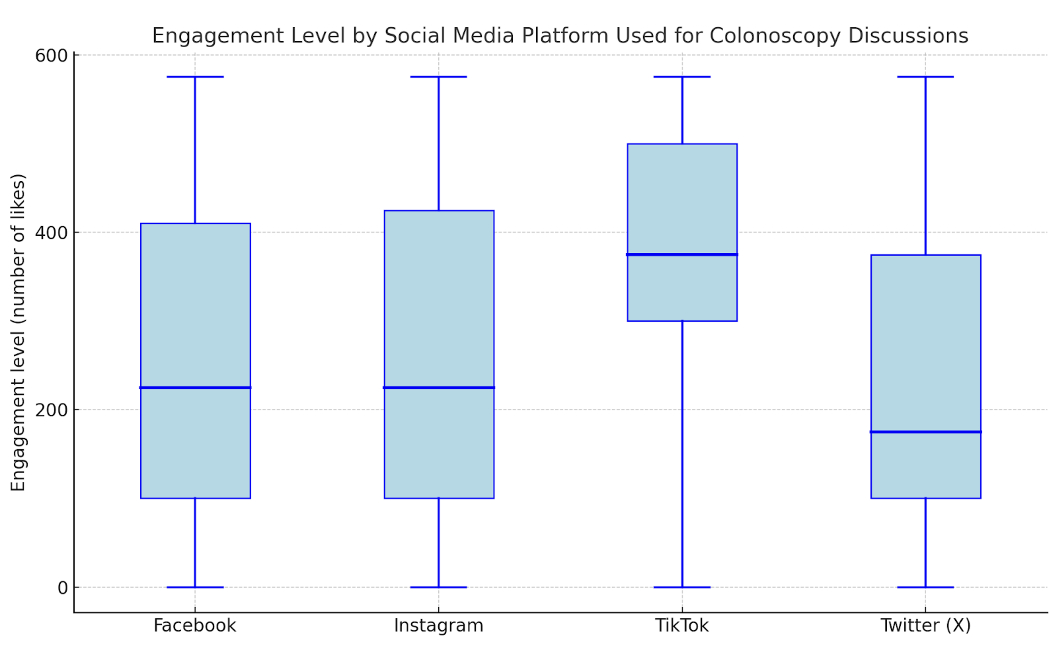Monday Poster Session
Category: Colorectal Cancer Prevention
P2605 - Social Media Engagement in Colonoscopy Experiences: Insights Into Patient Narratives and Perceptions
Monday, October 27, 2025
10:30 AM - 4:00 PM PDT
Location: Exhibit Hall

Thomas Stirrat, BS (he/him/his)
Georgetown University School of Medicine
Third Lake, IL
Presenting Author(s)
Thomas Stirrat, BS1, Deeptha Bejugam, BS2, Shankar S. Thiru, BS3, Anurag Paul, BS3, Joseph Atarere, MD4, Zachariah Foda, MD, PhD5, Priyanka Kanth, MD6
1Georgetown University School of Medicine, Third Lake, IL; 2Georgetown University School of Medicine, McLean, VA; 3Georgetown University School of Medicine, Washington, DC; 4MedStar Georgetown University Hospital, Baltimore, MD; 5Johns Hopkins University School of Medicine, Baltimore, MD; 6MedStar Georgetown University Hospital, Washington, DC
Introduction: Social media platforms have emerged as influential spaces for health communication, providing patients opportunities to share personal experiences and engage with others. This study analyzes colonoscopy-related discussions across Facebook, Instagram, TikTok, and X (formerly Twitter) from 2012 to 2022, focusing on patient narratives, emotional tones, and engagement dynamics.
Methods: A cross-sectional analysis of 1,505 posts was conducted using thematic coding and qualitative content analysis. Posts were identified through targeted hashtags and keywords. Emotional, procedural, social, and educational themes were assessed alongside platform-specific engagement metrics. Statistical analysis of engagement levels, thematic proportions, and platform distribution was performed using Stata 18.0.
Results: Most posts expressed a positive emotional tone (95.2%), with relief being the predominant sentiment (91.5%). Facebook accounted for 73% of posts, while TikTok demonstrated the highest engagement (average 361 likes per post). Procedural aspects and logistical challenges were rarely discussed (< 1%). Emotional and supportive themes dominated, emphasizing the role of social media in fostering patient reassurance and community support. Posts on TikTok and Instagram often utilized humor and creativity to share experiences, while Facebook enabled detailed narratives.
Discussion: The findings highlight social media’s potential in promoting colorectal cancer awareness and alleviating patient concerns through shared experiences. However, the scarcity of posts addressing practical and educational aspects underscores the need for more healthcare professional involvement to disseminate accurate and actionable information. Platform-specific trends suggest tailored strategies are necessary to optimize outreach and engagement.
Social media plays a critical role in shaping perceptions of colonoscopy, offering emotional support and increasing awareness. Enhancing the dissemination of evidence-based information through these platforms can further improve screening adherence and address disparities in colorectal cancer prevention.

Figure: Figure 1. PRISMA-style flow diagram of social-media post selection: from 2,788 posts initially retrieved, 410 non-patient and 863 healthcare-organization posts were excluded, leaving 1,505 patient-generated posts for thematic coding.

Figure: Figure 2. Box-and-whisker plots of engagement (likes) by platform for colonoscopy discussions show TikTok posts achieving the highest median likes, Facebook and Instagram intermediate levels, and Twitter (X) the lowest. Boxes represent interquartile ranges with whiskers at 1.5 × IQR, highlighting greater variability in TikTok engagement.
Disclosures:
Thomas Stirrat indicated no relevant financial relationships.
Deeptha Bejugam indicated no relevant financial relationships.
Shankar Thiru indicated no relevant financial relationships.
Anurag Paul indicated no relevant financial relationships.
Joseph Atarere indicated no relevant financial relationships.
Zachariah Foda: Delfi Diagnostics – Consultant, Intellectual Property/Patents, Royalties.
Priyanka Kanth indicated no relevant financial relationships.
Thomas Stirrat, BS1, Deeptha Bejugam, BS2, Shankar S. Thiru, BS3, Anurag Paul, BS3, Joseph Atarere, MD4, Zachariah Foda, MD, PhD5, Priyanka Kanth, MD6. P2605 - Social Media Engagement in Colonoscopy Experiences: Insights Into Patient Narratives and Perceptions, ACG 2025 Annual Scientific Meeting Abstracts. Phoenix, AZ: American College of Gastroenterology.
1Georgetown University School of Medicine, Third Lake, IL; 2Georgetown University School of Medicine, McLean, VA; 3Georgetown University School of Medicine, Washington, DC; 4MedStar Georgetown University Hospital, Baltimore, MD; 5Johns Hopkins University School of Medicine, Baltimore, MD; 6MedStar Georgetown University Hospital, Washington, DC
Introduction: Social media platforms have emerged as influential spaces for health communication, providing patients opportunities to share personal experiences and engage with others. This study analyzes colonoscopy-related discussions across Facebook, Instagram, TikTok, and X (formerly Twitter) from 2012 to 2022, focusing on patient narratives, emotional tones, and engagement dynamics.
Methods: A cross-sectional analysis of 1,505 posts was conducted using thematic coding and qualitative content analysis. Posts were identified through targeted hashtags and keywords. Emotional, procedural, social, and educational themes were assessed alongside platform-specific engagement metrics. Statistical analysis of engagement levels, thematic proportions, and platform distribution was performed using Stata 18.0.
Results: Most posts expressed a positive emotional tone (95.2%), with relief being the predominant sentiment (91.5%). Facebook accounted for 73% of posts, while TikTok demonstrated the highest engagement (average 361 likes per post). Procedural aspects and logistical challenges were rarely discussed (< 1%). Emotional and supportive themes dominated, emphasizing the role of social media in fostering patient reassurance and community support. Posts on TikTok and Instagram often utilized humor and creativity to share experiences, while Facebook enabled detailed narratives.
Discussion: The findings highlight social media’s potential in promoting colorectal cancer awareness and alleviating patient concerns through shared experiences. However, the scarcity of posts addressing practical and educational aspects underscores the need for more healthcare professional involvement to disseminate accurate and actionable information. Platform-specific trends suggest tailored strategies are necessary to optimize outreach and engagement.
Social media plays a critical role in shaping perceptions of colonoscopy, offering emotional support and increasing awareness. Enhancing the dissemination of evidence-based information through these platforms can further improve screening adherence and address disparities in colorectal cancer prevention.

Figure: Figure 1. PRISMA-style flow diagram of social-media post selection: from 2,788 posts initially retrieved, 410 non-patient and 863 healthcare-organization posts were excluded, leaving 1,505 patient-generated posts for thematic coding.

Figure: Figure 2. Box-and-whisker plots of engagement (likes) by platform for colonoscopy discussions show TikTok posts achieving the highest median likes, Facebook and Instagram intermediate levels, and Twitter (X) the lowest. Boxes represent interquartile ranges with whiskers at 1.5 × IQR, highlighting greater variability in TikTok engagement.
Disclosures:
Thomas Stirrat indicated no relevant financial relationships.
Deeptha Bejugam indicated no relevant financial relationships.
Shankar Thiru indicated no relevant financial relationships.
Anurag Paul indicated no relevant financial relationships.
Joseph Atarere indicated no relevant financial relationships.
Zachariah Foda: Delfi Diagnostics – Consultant, Intellectual Property/Patents, Royalties.
Priyanka Kanth indicated no relevant financial relationships.
Thomas Stirrat, BS1, Deeptha Bejugam, BS2, Shankar S. Thiru, BS3, Anurag Paul, BS3, Joseph Atarere, MD4, Zachariah Foda, MD, PhD5, Priyanka Kanth, MD6. P2605 - Social Media Engagement in Colonoscopy Experiences: Insights Into Patient Narratives and Perceptions, ACG 2025 Annual Scientific Meeting Abstracts. Phoenix, AZ: American College of Gastroenterology.
